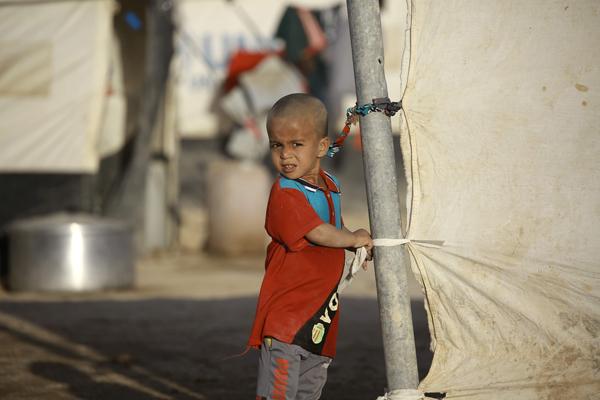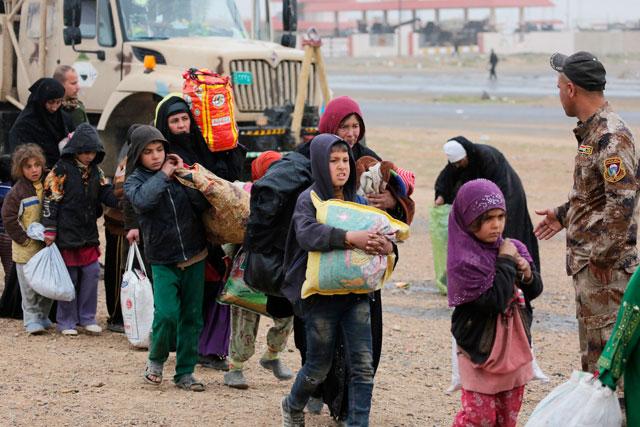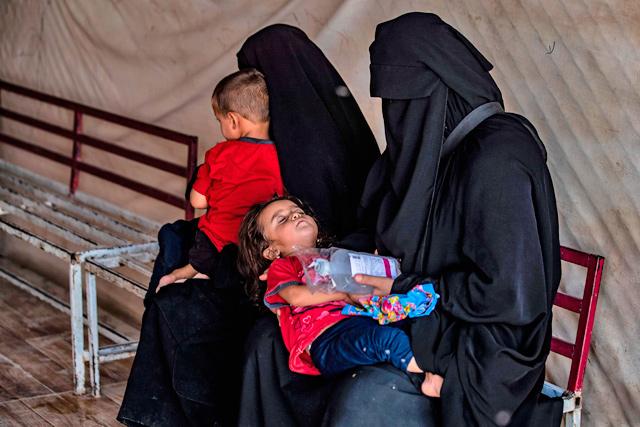You are here
Iraqis flee Daesh-held Mosul for war-torn Syria
By AFP - Oct 20,2016 - Last updated at Oct 20,2016

A young Iraqi refugee, who fled due to the ongoing conflict between pro-government forces and Daesh terror group militants, stands at a camp in the northeastern town of Al Hawl in Syria’s Hasakeh province on Wednesday (AFP photo)
AL HAWL, Syria — At a refugee camp in Syria’s Al Hawl, 11-year-old Jawaher limps from a wound she sustained in a Daesh terror group mortar attack while she and family were fleeing Iraq’s Mosul.
Her family are among the thousands who fled the city just before the October 17 start of an offensive by the Iraqi army and the US-led anti-Daesh coalition to retake the city from extremists.
She was crossing from Iraq into Syria, seeking refuge in the war-torn country, when she came under fire.
“I was sitting with my friends, I just saw a shell land between us and I passed out,” she whispers, her head covered in a pink veil.
“My foot still hurts from the shrapnel, but I’m feeling a bit better now.”
Around her, white tents are lined up in the desert, battered by dust.
Men and women wander around the makeshift camp, some carrying a child, or boxes of supplies, others hauling stuffed backpacks or heavy luggage.
Al Hawl lies in Syria’s northeastern Hasakeh province, much of which was held by Daesh, though Kurdish and Arab forces backed by the US-led coalition have taken large swathes of territory back from the extremist group.
The UN and aid groups have already sounded the alarm about the massive wave of Iraqis expected to be displaced by the Mosul offensive.
Some 5,000 Iraqi civilians have arrived in Syria in the last 10 days alone, according to Save the Children.
Constant fear
To cope with the influx, bulldozers are busy expanding the camp at Al Hawl, a few kilometres from the Iraqi border.
Around 6,000 Iraqi refugees have been in the camp for the last two years, but the population is expected to swell to as many as 30,000 people, according to Roder Younes, an official with the local Kurdish administration responsible for the camp.
“There are between 2,000 and 3,000 people waiting at the border,” he told AFP.
“Five hundred Iraqis have entered the camp in the last two weeks.”
The process is slowed by the need to carefully vet the arrivals, he added.
“There are security procedures to follow. We’re afraid that Daesh elements might try to infiltrate disguised as civilians.”
More than 200 kilometres of arid territory separate Al Hawl camp from Mosul, which has been controlled by Daesh since June 2014.
Refugees fleeing must travel most of that distance on foot, through territory mined by Daesh, which also fires on civilians as they escape in a bid to prevent them from leaving.
“We walked all night, in the middle of explosions and bombs. Bullets whistled over our heads until we got to the border,” says Ibtissam Khadr, her face wrapped in a black veil.
“If Daesh knew we were going to escape, they would have cut our throats,” she adds, sitting with her children at the entrance of a tent.
“We got here thanks to Syrian smugglers. We were afraid of everything: the planes, Daesh. The fear didn’t leave us for even a minute.”
‘We are ruined’
The United Nations estimates some 200,000 people could be displaced in the first two weeks alone of the operation to retake Mosul.
But the operation is expected to last weeks or months, and the numbers of those fleeing the fighting and the extremist group will likely increase significantly.
Fayez Affar sits cross-legged on the ground in his tents, displaying his swollen and bruised feet.
“On the road, a mine exploded in front of one of the families that was with us. Other families lost their children on the way,” he says.
Jawaher’s father, Shams Mahdi, sits on his suitcase, his face tired and his robes covered in dust.
He is hoping to get a tent for his family, who are currently sharing with another family.
“The situation is catastrophic, we are ruined,” he says sadly.
“But it is still better than living under Daesh.”
Related Articles
SOUTH OF MOSUL, Iraq — Iraqi authorities are holding 1,400 foreign wives and children of suspected Daesh militants in a camp after governmen
HAMAM AL ALIL, Iraq-The gunshot rang out as civilians tried to escape the west of Mosul, where Iraqi forces are battling extremists, killing
AL HOL CAMP, Syria — Maha Al Nasser queues in front of a crowded clinic in Syria's Al Hol camp, her frail daughter squirming in her arms und













